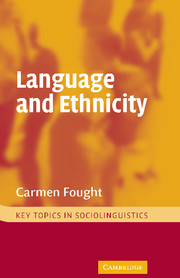Book contents
- Frontmatter
- Contents
- Preface
- Acknowledgments
- Part I General issues in ethnicity and language
- Part II Linguistic features and ethnicity in specific groups
- 3 African-American groups
- 4 Latino groups
- 5 Linguistic variation in other multiethnic settings
- 6 Are white people ethnic? Whiteness, dominance, and ethnicity
- 7 Dialect contact, ethnicity, and language change
- Part III The role of language use in ethnicity
- Notes
- Glossary of terms
- References
- Index
- References
4 - Latino groups
Published online by Cambridge University Press: 05 September 2012
- Frontmatter
- Contents
- Preface
- Acknowledgments
- Part I General issues in ethnicity and language
- Part II Linguistic features and ethnicity in specific groups
- 3 African-American groups
- 4 Latino groups
- 5 Linguistic variation in other multiethnic settings
- 6 Are white people ethnic? Whiteness, dominance, and ethnicity
- 7 Dialect contact, ethnicity, and language change
- Part III The role of language use in ethnicity
- Notes
- Glossary of terms
- References
- Index
- References
Summary
Two languages sounds better for us Mexicans.
(David, a 17-year-old Mexican-American speaker from Los Angeles, talking about code-switching, from Fought 2003:209)While the construction of ethnicity by African-Americans generally involves choices related to different dialects or possibly styles of English, for Latino groups in the USA, as for many ethnic groups around the world, the relationship of language to ethnicity can also encompass an entirely separate language, in this case, Spanish, as well as the use of code-switching. In looking at ethnic identity among Latinos and Latinas, then, we must look not only at the range of dialects and discourse styles available to them, but also at how bilingualism (or monolingualism) fits into the picture that the community has of what it means to be Mexican-American, Puerto-Rican American, and so forth. Both bilingualism or multilingualism and code-switching have been the focus of a great deal of study in sociolinguistics, although most of the research that relates them to ethnicity has focused on communities as a whole rather than on how these factors fit into the individual construction of ethnic identity. The Latino groups discussed here serve as good case studies for the exploration of issues related to ethnic identity that arise in specifically bilingual settings.
With that said, it is also important to note that the linguistic expression of identity for Latinos and Latinas in the USA is not only or even primarily signaled by an ability to speak Spanish.
- Type
- Chapter
- Information
- Language and Ethnicity , pp. 70 - 88Publisher: Cambridge University PressPrint publication year: 2006

